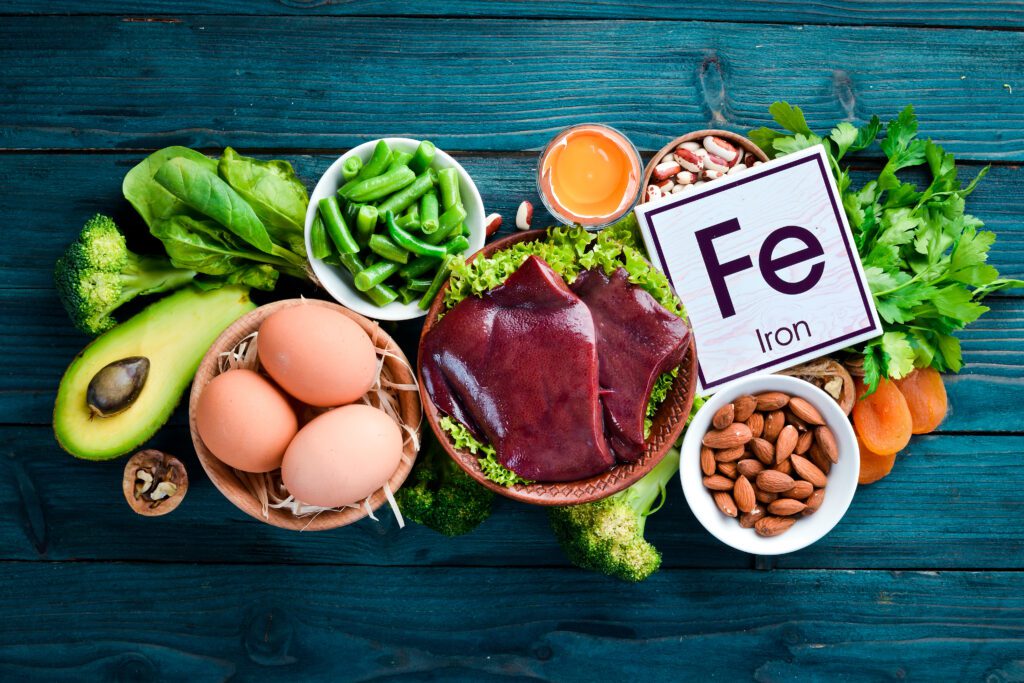The relationship between iron and proper blood health is well-documented. Iron cannot be produced by the body, yet this essential micronutrient is required for the production of red blood cells in order to carry oxygen from the lungs to other parts of the body. Unfortunately, iron is also the most common nutritional deficiency worldwide. While the typical Western diet makes iron deficiency less common in the US, there are still about 10 million people living in the US with low iron levels. Iron deficiency is also the most common source of anemia, which is a condition marked by inadequate amounts of oxygen carried throughout the body as a result of reduced levels of red blood cells and hemoglobin. Roughly 5 million people in the US have been diagnosed with iron deficiency anemia.
With reduced amounts of oxygen being carried through the bloodstream, fatigue and lethargy are often the first noticeable signs of iron deficiency anemia. Yet, medical experts have discovered that iron also supports other processes and functions that influence whole body health, including cognitive and immune function.
How Does Iron Support Comprehensive Wellness?
Iron is known to perform a variety of roles that help the body to operate at a functional level.
Red Blood Cell Function
Iron’s most prominent role in the body can be tied to its relationship with red blood cells. Iron is an essential component of both hemoglobin and myoglobin, two proteins that the body needs for the production of red blood cells. Inadequate levels of either protein often lead to iron deficiency anemia as a result of the body struggling to produce red blood cells.
Hemoglobin is the protein located within red blood cells that carries oxygen from the lungs throughout the rest of the body, while myoglobin is responsible for carrying oxygen to the muscles.
Cognitive Health
Iron is a crucial requirement of proper brain development in children. That connection continues through adulthood, as iron deficiency anemia has been connected to various forms of reduced cognitive function, including issues with mood regulation, attention span, sensory perception and overall intelligence.
Immune System Health
For years, experts believed that iron deficiency was a consequence of blood lost from inflammatory bowel disease (IBD). However, recent research suggests that the experts were looking at that relationship backwards; it is now believed that iron deficiency can actually lead to IBD. This same research indicates that not only do immune cells absorb iron, but iron actually regulates immune cell function. With roughly 70 percent of the body’s immune cells residing in the gut, iron is responsible for proper immune function on a macro level. If iron levels are inadequate, the body will be less equipped to fight infection and reduce the risk of illness.
How Does Iron Deficiency Anemia Impact Whole Body Health?
Anemia is a condition defined by the body not having enough red blood cells to transport oxygen throughout the body to be used for energy, and iron deficiency is the most common source of this condition. Iron deficiency itself can be the result of various sources, including:
- Diets that lack iron
- Body changes, such as pregnancy
- Blood loss from such sources as injury and menstrual bleeding
When iron levels are low enough to cause iron deficiency anemia, the body can experience a wide range of symptoms and health conditions that include:
- Fatigue
- Pale skin
- Elevated heart rate (tachycardia)
- Hair loss
- Increased sensitivity to cold
- Lightheadedness
- Brittle nails
- Shortness of breath
- Issues with focusing
- Inflammation or swelling of the tongue
The Best Dietary Sources of Iron
When looking to obtain the best dietary sources of iron, it is important to understand that there are two types of iron: heme and non-heme.
Heme iron is more highly bioavailable (absorbable) than non-heme and can be absorbed into the bloodstream far more easily. This form of iron can be found in various dietary forms of animal flesh, including:
- Beef
- Poultry
- Canned sardines
- Canned light tuna
- Organ meats
- Mussels, oysters and clams
- Beef or chicken liver
Non-heme iron comes from plant sources. While there are plenty of dietary sources of non-heme iron, the body struggles to absorb it into the bloodstream effectively. This lack of bioavailability can make it difficult for vegetarians and vegans to obtain adequate amounts of iron, which places them at a higher risk of suffering from iron deficiency anemia. The most common dietary sources of non- heme iron include:
- Beans
- Lentils
- Nuts
- Seeds
- Spinach
- Dark chocolate
- Fortified breakfast cereals
- Enriched bread or rice
- Potato with skin
Supplementing With Iron
Not everyone needs to supplement with iron due to the typical Western diet being able to provide the human body with sufficient amounts of this essential micronutrient. However, some segments of the population have to rely on supplements to obtain enough iron to support optimal whole-body health, including pregnant women, menstruating women, vegetarians and vegans.
To help ensure that people can provide their bodies with iron that their bodies can actually utilize, the integrative medicine experts at EVEXIAS Health Solutions have developed Iron Bis-Glycinate. This professional grade nutraceutical product contains iron bisglycinate, which is a chelated form of iron that the body can absorb and utilize more effectively. Iron Bis-Glycinate has also been packed with other nutrients that can help the body to perform at an optimal level, including vitamin C. In addition to being a powerful antioxidant, this essential vitamin has long been recognized for its ability to enhance the bioavailability of iron.
For further support of comprehensive wellness, the experts at EVEXIAS Health Solutions offer a variety of more focused therapies, including lifestyle management guidance and hormone replacement therapy (HRT). Find the nearest EvexiPEL Certified Provider today to learn more about the best ways to promote optimal iron levels and other aspects of whole-body health.








